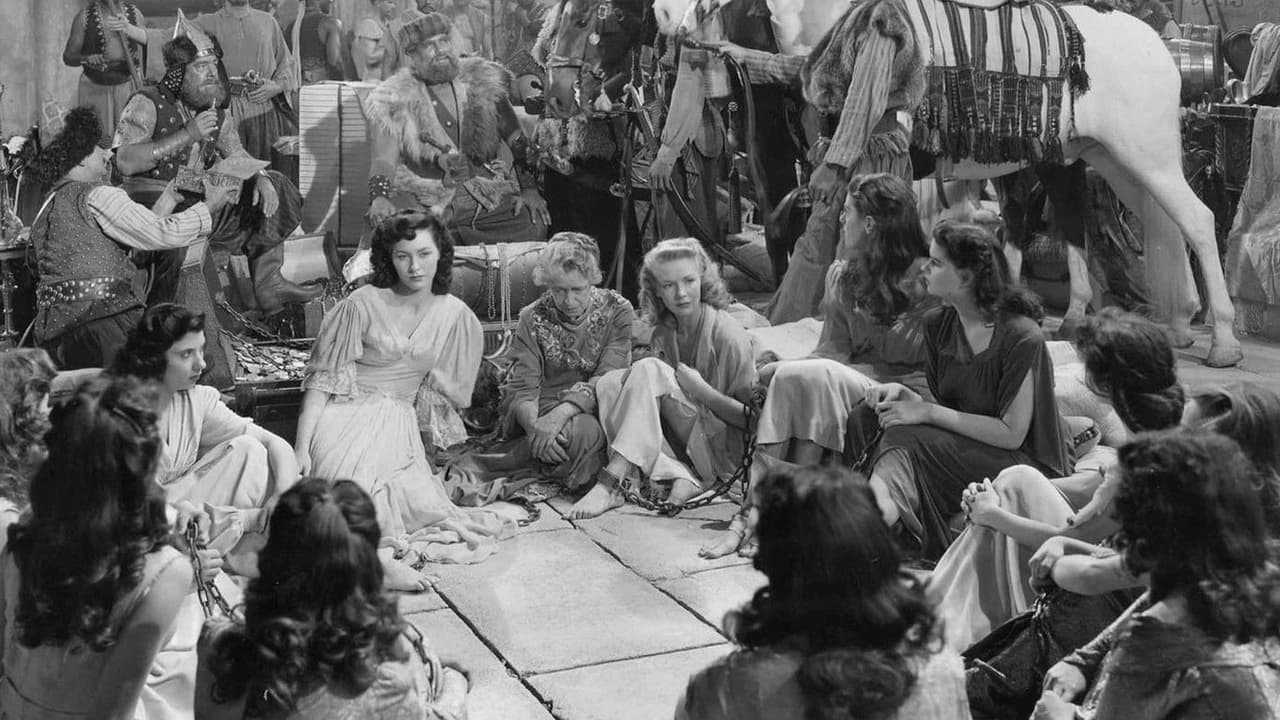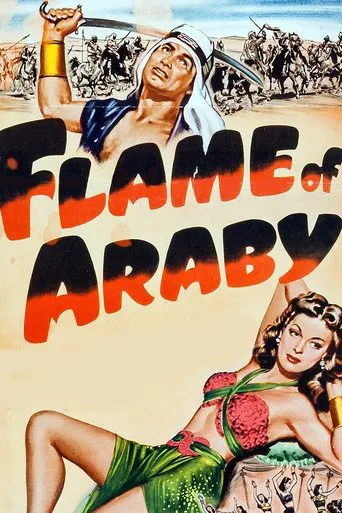

One of many Universal B films of the '40s and '50s, shot in Technicolor, with the theme of exotic locals and stories, or westerns. This one has the style of an Arabian Nights story, but more earthy. It stars Jeff Chandler, as the Bedouin chief Tamerlane, and flaming-haired Maureen O'Hara as the Tunisian princess Tanya, whom her cousin, the new king of Tunisia, wanted to auction off to one of the piratical Barbarossa brothers, who headed a long-established sizable enterprise of pirate ships in the Mediterranean and beyond......I find the choice of Tamerlane as Chandler's Bedouin name curious. The historical Tamerlane, of course, was a quasi-Mongol of west-central Asia, with the ambition of conquering as much territory as he could in one lifetime. ......Some reviewers criticize the acting and dialogue as wooden. The dialogue of the principals is somewhat stilted, in the style of The Arabian Nights, but that's also the way Maureen and Chandler talked in most of their films......There has been some discussion as to whether Tanya's red hair was appropriate for a Tunisian princess. Unexpected, but perhaps her mother was Irish. You should note that the beards of the 2 main Barbarossa chiefs were slightly or clearly reddish. In fact, Barbarossa means 'with red beard' in Italian.......Tamerlane and Princess Tanya spend the better part of the film trying to decide if they hate or love each other. The fact that they had been brought up in such disparate circumstances didn't help their sometimes attraction to each other. Supposing they did marry, where would they reside? Tamerlane flat out told her that he was not going to live in her palace. On the other hand, Tanya wasn't sure she could hack the typical life of a Bedouin wife, giving up her luxurious lifestyle. Finally, she decided her love and respect for Tamerlane trumped her fear of a culture shock. These 2 spent much of the film arguing who would be the owner of the superfast wild black stallion Shahzada, assuming that Tamerlane and aids captured him. Tanya claimed she needed a horse which would win the annual horse race, because it was decided that the owner of the winning horse would have the honor of naming her husband. She didn't want to marry either of the Barbarossa brothers, whose horses usually won. Finally, she relented, and agreed to allow Tamerlane, on Shahzada, to race, with the understanding that Tamerlane would name himself, if he won...... I think Shahzada merited a special acting award, as he progressed from the leader of a herd of horses, to being roped, to being tamed, to accepting a saddle and rider, to becoming a race horse, all in a few days. Or did they use different all- black horses for the various stages in his domestication?.......Tiny Susan Cabot(Clio), on screen for only a short stretch, acts as a dancing slave girl for one of the Barbarossa clan: Malik, who gets jealous when she flirts with Tamerlane He challenges Tamerlane to a dual with weapons, and loses. Clio then leads a mob to tear Tamerlane apart., which he survives......I thought the film was rather fun, if a tad unrealistic. It had an interesting screenplay, and interesting landscapes , often with big boulders, or very narrow canyons, and even a hidden tunnel behind a waterfall, that perplexed everyone hunting for Shahzada. Seems unlikely that Tamerlane, as a Bedouin chief, would be unmarried. Perhaps he was allowed 2 wives? From photos I've seen, Maureen might have trouble competing with some of the more beautiful Bedouin women. See it at YouTube
... View MoreYour enjoyment of this will depend on your ability to swallow the preposterous liberties the studios took with casting in the 50's. In this instance we have the Irish Maureen O'Hara, slight lilt intact, and the Jewish Jeff Chandler playing an Arabian princess and a Bedouin chieftain respectively racing around what is obviously the California desert standing in for the Sahara.Queen of Technicolor Maureen is breathtaking and Jeff properly rugged but most of the acting tends towards woodenness. If you appreciate the campiness of that scenario than this is harmless fun, all others beware.
... View MoreI am writing this because another wrote a throughly shoddy review which is undeserved; complaining about hair color & other unimportant things, whilst going on & on about Maria Montez, not that I am being disrespectful towards her, not at all, but as much as I too enjoyed the Jon Hall/Maria Montez movies, but ne'er could Maria Montez ever compare to Maureen O'Hara. I just this moment, finished watching the movie 'Bagdad', this other reviewer wrote a similar review for that movie also & it is just a pitiful.I do not consider any of the parts overacted, nor do I find it odd for a Bedouin princess princess to have Flaming Red Hair. Where did it say that she was Bedouin, only a Bedouin princess. For all we know her mother could be Irish (like Maureen), just as Cleopatra VII had no Egyptian blood within her veins, or more currently, (1810) the current dynasty of Sweden (the Bernadottes) originally were French (Jean-Baptiste Bernadotte, a Marshall of France, during the time of Napoleon I), was elected heir to King Charles XIII of Sweden.But aside from these justifications regarding hair color, we must remember that things like hair color are not important things to consider when reviewing a movie, but only whether or the the movie was entertaining. In that regard I can say that I shan't be clambering to see this one again, or 'Bagdad' either. The sets were beautiful, the costumes even more so, but the movie itself, just wasn't that good. But this is the fault of the script, not any other.
... View MoreSaw this film when I was 13, and it struck me at the time that Maureen O'Hara -- as Irish as the Blarney Stone -- plays an Arab. They didn't even give her a brunette wig.At one point one of Maureen's retainers says "You will ride unveiled!" Maureen replies "If necessary I would ride unclad!" now that would be worth seeing!Jeff Chandler does his usual solid job. 4.8/10 might be a bit of an overrating.
... View More